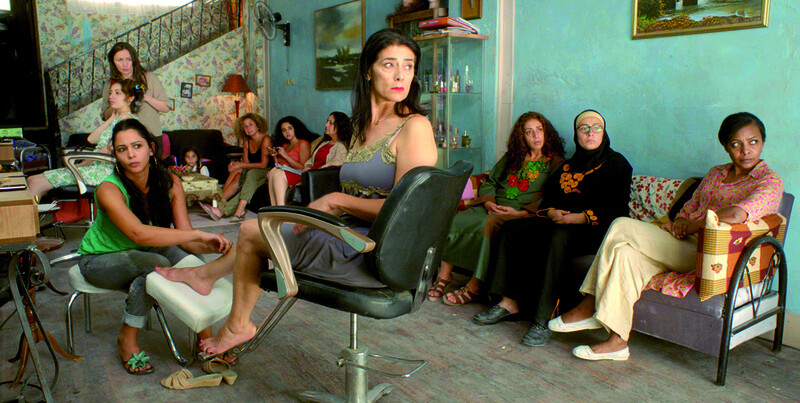The Electronic Intifada 22 December 2015

The women of Tarzan and Arab Nasser’s Dégradé.
Dégradé, written and directed by Gaza-born twins Tarzan and Arab Nasser, is not an easy film to watch.
The Nasser brothers’ debut feature unfolds like a play: the time frame of the story is as long as the film, taking place almost entirely in a small beauty salon in Gaza packed with a dozen women of varying temperaments.
Though the cast is made up almost entirely of women — who get the majority of the screen time — at the center of the story is Ahmad, performed by Tarzan Nasser, the tragic sweetheart of the stylist Wedad, performed by a tearful Maisa Abd Elhadi (Habibi Rasak Kharban).
Ahmad is a mafioso thug who stole a lioness from Gaza’s only zoo, which paid a lot of money to smuggle the animal in from Egypt. The Hamas authorities have made it a priority to capture both the lioness and Ahmad.
Thin on plot, Dégradé is overstuffed with dialogue — the women in the salon bicker at each other, judge one another or complain about their husbands.
Many of them are waiting for their turn in the chair, which is occupied by Salma, an educated young bride getting her hair and makeup done by Christine, a Russian woman married to a Gazan man and who refuses to let her restless daughter play outside.
Hiam Abbas (Miral, The Visitor) is typecast as a scorned wife obsessed with her fading looks and who takes out her anger on young Wedad.
Reflected in the salon’s mirrors are Salma’s saintly mother and evil future step-mother, as well as her fiancé’s sister. Also in the room are a Tramadol-popping chatterbox and her pious, frowning companion; a very pregnant woman and her sister; and a woman who divorced her husband because he spent more time at the mosque than with her.
Gaza
The lives of these women are weighed down by the political situation in Gaza.
Israeli closures mean that the mother of the bride cannot get the medical treatment she needs. The televised news plays in the background and the screen flickers as an Israeli drone buzzes overhead. When the salon door opens, it reveals dusty streets roamed by unruly, rifle-toting young men. The salon is plunged into darkness when an electricity cut comes one day earlier than scheduled.
The women, who never stop talking — whether at each other or into their cell phones — rant about the electricity company, about Hamas, and about Hamas’ predecessors. They have scant control over this terrible mess created by men, and little room to breathe in Christine’s overcrowded, hot salon.
The portrayal of women here is problematic, as the characters are almost entirely defined by their relationships to the men in their lives. Ahmad’s name is repeated more frequently than any other character’s, it seems — the names of many of the women are mentioned only once, if at all.
The female sex more generally is used as a prop to give blunt commentary on the apparently senseless violence of men.
The result is superficial archetypes instead of believable, relatable characters. And it doesn’t lend itself to sharp political analysis, either.
Unhappy women
The audience knows that the situation in Gaza is bad, but the context of the fighting that eventually imprisons the women in the salon is so vague that viewers not familiar with the place would be forgiven for wondering whether the guns are being fired by Israelis or Palestinians.
Western film festival-goers will leave screenings of Dégradé patting themselves on the back, having affirmed their misconceptions that the bad situation in Gaza is as much the fault of the Palestinians as it is the Israelis.
Worryingly, the film has been called brave by The Guardian’s reviewer for heaping most of its characters’ wrath on Hamas, and Israel’s Ynet ran the headline “New Palestinian film criticizes Hamas.”
Audiences won’t likely come away with any new understanding of life in Gaza — perhaps only relief that they don’t have to endure further the nagging drone from which Dégradé’s unhappy, one-dimensional women have no escape.
Palestine cinephiles who have seen the Nasser brothers’ brilliant short Condom Lead may be surprised by this more heavy-handed debut feature. Also taking up the dire situation in Gaza, that film promises much more sophisticated filmmaking from the pair in the future.
Maureen Clare Murphy is managing editor of The Electronic Intifada.






Comments
WooooooW!
Permalink Anonymous replied on
WooooooW!
Degrade
Permalink Kay Osatenko replied on
This won't be the first time the Guardian has got it wrong and Ynet is no surprise. Anyone familiar with theatre of the absurd can see the clues: 1) the women are 'imprisoned' in the beauty parlour and can't see the context as in their lives are controlled by the folks at the checkpoints, sniper towers in a singular loss of perspective (it happens) 2) they speak of banalities randomly in a collective loss of perspective (it happens) 3) the film's title is DEGRADED. The play Waiting for Godot comes to mind. I for one would like to see this film. BTW, Michael Billington, theatre critic for the Guardian recently put out a list of 101 of the greatest plays and left out Waiting for Godot because 'it would not have the same impact today'. So, even a critic whom I admire can get it wrong. Where can I see this film?